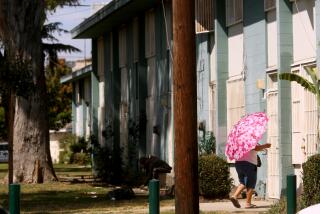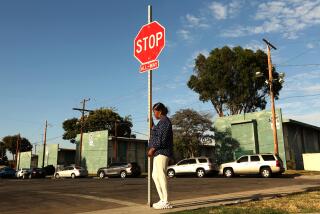U.S. Conciliator Assigned to Watts Housing Project : Community relations: He will try to defuse animosity that has developed between Imperial Courts residents and police since shooting.
- Share via
The U.S. Justice Department, concerned about tensions at the Imperial Courts housing project, has dispatched a federal mediator to the Watts complex to help defuse animosity between tenants and police.
“Because of the tension level, this is a high priority for us,” said Vermont R. McKinney, the mediator charged with bridging the communication gulf that has developed since police fatally shot Henry Peco at the project Nov. 29.
A group of tenants has launched a high-profile campaign against what they describe as ongoing harassment and disrespectful treatment by police. They have twice brought their complaints before the city Police Commission and last week held an emotional “justice” rally featuring the Rev. Jesse Jackson.
So strained are relations that tenants have retained attorney Anthony Willoughby to research whether they should seek a court order barring police from the project--a legal action, the success of which Willoughby called “not probable, but possible.”
Julian Klugman, regional director of the Community Relations Service division of the Justice Department, said he assigned McKinney to Imperial Courts after reading news accounts of the dispute.
“We felt this was serious enough to merit our attention,” he said from his San Francisco office.
The mediators are not connected to the law enforcement arm of the Justice Department and, under federal law, cannot testify in court or bring charges. They serve as behind-the-scenes conciliators who attempt to resolve civil rights and racial disputes through voluntary meetings and confidential discussions, Klugman said.
McKinney, a former Jordan High School basketball star and community organizer, said he intends to meet privately with tenant leaders, police and city officials to attempt to bring the factions together to discuss reforms at the six-square-block project.
“We need to talk about what the problems are and how they are viewed by each side,” McKinney said. “Perceptions are important. Even if they are not factual, in time they become reality and take over and add to tensions and frustrations.”
According to police, the 28-year-old Peco was killed when he and two other men opened fire on officers during a nighttime power outage at the complex. Peco’s two alleged accomplices have implicated him in a taped interview with police, authorities said.
Peco’s relatives and a tenant group say that Peco was unarmed and was shot without provocation while he was walking across the courtyard. Police have not recovered the assault rifle that Peco allegedly fired.
Since the shooting, at least six tenants have publicly complained that their apartments have been illegally searched by police and that they were arrested without cause. Police have denied illegal enforcement actions and South Bureau Deputy Chief Matthew Hunt said he will investigate the allegations.
McKinney said that although tenants have compared the project to a “powder keg,” he believes after initial discussions that there is a willingness on both sides to meet.
Tenant leader Perry Crouch said he believes McKinney “has the influence to bring people together to the bargaining table and force them to really look at the issues.” He said that along with policing reforms, tenants want city leaders to respond to their call for more youth activities and job training programs at the project.
Hunt, whose South Bureau includes Imperial Courts, said he will give McKinney “110% cooperation.”
“If he can help us make some contacts and develop some rapport with some of the residents, particularly the decent folks who are there . . . it can help us bridge the gap that exists,” Hunt said.
In the past year, Justice Department mediators have worked in Los Angeles to bring together police and minority groups in the aftermath of the police beating of Rodney G. King and have participated in talks between Korean-Americans and blacks after the shooting of Latasha Harlins by a Korean-born grocer.
More to Read
Sign up for Essential California
The most important California stories and recommendations in your inbox every morning.
You may occasionally receive promotional content from the Los Angeles Times.












